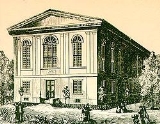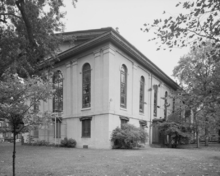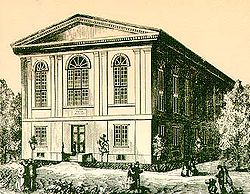
Wagner Free Institute of Science
Encyclopedia
The Wagner Free Institute of Science is a natural history
museum
located in Philadelphia, Pennsylvania
. It was founded in 1855 by William Wagner, a notable merchant, philanthropist, and gentleman scientist
of the time, who sought to offer free educational courses to all who would seek to learn about the natural world. Wagner began offering free lectures on science at his home, Elm Grove, a colonial farm estate on the outskirts of Philadelphia in 1847. To illustrate the lectures he drew on a collection of specimens he had gathered since his boyhood. All of the classes were offered with an open admission policy that allowed women as well as men to attend. These lectures became so popular that by 1855 he moved them first to a public hall to accommodate the rapidly growing audience, and later to its permanent home designed by Philadelphia architect John McArthur, Jr.
, who would go on to design Philadelphia's City Hall.

 Wagner continued to lecture and to lead the unique institution until his death in 1885. The Board of Trustees then appointed Joseph Leidy
Wagner continued to lecture and to lead the unique institution until his death in 1885. The Board of Trustees then appointed Joseph Leidy
, a biologist of international reputation, to head its scientific and educational programs. Leidy's appointment ushered in an active and productive era in which the Institute's mission and programs were greatly expanded. Leidy's most lasting and significant contribution to the Institute was his reorganization of the Institute's museum. He greatly enlarged Wagner's original collection by further field collection, purchases and other acquisitions. Leidy personally developed and supervised their reorganization into a systematic display in which specimens and cases were arranged according to Darwin's theory of evolution
, so that visitors moved from simpler to more complex organisms and through geologic time as they walked through the exhibition hall. This new display opened in 1891 and little has been altered since Leidy's time, making the Institute an exceptional example of a Victorian era
science museum.
The Institute has continued to carry out Wagner's initial goals of offering free science courses, while also functioning as a library, lecture hall and museum. Today, the Wagner Free Institute of Science is widely recognized as one of Philadelphia's historical treasures. While preserving its historic building and collections for future generations to enjoy, the Institute also serves as a rich educational resource for programs on science, natural history, and the history of science from the nineteenth century to the present.
Natural history
Natural history is the scientific research of plants or animals, leaning more towards observational rather than experimental methods of study, and encompasses more research published in magazines than in academic journals. Grouped among the natural sciences, natural history is the systematic study...
museum
Museum
A museum is an institution that cares for a collection of artifacts and other objects of scientific, artistic, cultural, or historical importance and makes them available for public viewing through exhibits that may be permanent or temporary. Most large museums are located in major cities...
located in Philadelphia, Pennsylvania
Pennsylvania
The Commonwealth of Pennsylvania is a U.S. state that is located in the Northeastern and Mid-Atlantic regions of the United States. The state borders Delaware and Maryland to the south, West Virginia to the southwest, Ohio to the west, New York and Ontario, Canada, to the north, and New Jersey to...
. It was founded in 1855 by William Wagner, a notable merchant, philanthropist, and gentleman scientist
Gentleman scientist
A gentleman scientist is a financially independent scientist who pursues scientific study as a hobby. The term arose in post-Renaissance Europe but became less common in the 20th century as government and private funding increased.-History:...
of the time, who sought to offer free educational courses to all who would seek to learn about the natural world. Wagner began offering free lectures on science at his home, Elm Grove, a colonial farm estate on the outskirts of Philadelphia in 1847. To illustrate the lectures he drew on a collection of specimens he had gathered since his boyhood. All of the classes were offered with an open admission policy that allowed women as well as men to attend. These lectures became so popular that by 1855 he moved them first to a public hall to accommodate the rapidly growing audience, and later to its permanent home designed by Philadelphia architect John McArthur, Jr.
John McArthur, Jr.
John McArthur Jr was a prominent American architect practicing from Philadelphia, Pennsylvania. Designer of some of the city's most ambitious buildings of the Civil War era, few of his works survive...
, who would go on to design Philadelphia's City Hall.


Joseph Leidy
Joseph Leidy was an American paleontologist.Leidy was professor of anatomy at the University of Pennsylvania, and later was a professor of natural history at Swarthmore College. His book Extinct Fauna of Dakota and Nebraska contained many species not previously described and many previously...
, a biologist of international reputation, to head its scientific and educational programs. Leidy's appointment ushered in an active and productive era in which the Institute's mission and programs were greatly expanded. Leidy's most lasting and significant contribution to the Institute was his reorganization of the Institute's museum. He greatly enlarged Wagner's original collection by further field collection, purchases and other acquisitions. Leidy personally developed and supervised their reorganization into a systematic display in which specimens and cases were arranged according to Darwin's theory of evolution
Evolution
Evolution is any change across successive generations in the heritable characteristics of biological populations. Evolutionary processes give rise to diversity at every level of biological organisation, including species, individual organisms and molecules such as DNA and proteins.Life on Earth...
, so that visitors moved from simpler to more complex organisms and through geologic time as they walked through the exhibition hall. This new display opened in 1891 and little has been altered since Leidy's time, making the Institute an exceptional example of a Victorian era
Victorian era
The Victorian era of British history was the period of Queen Victoria's reign from 20 June 1837 until her death on 22 January 1901. It was a long period of peace, prosperity, refined sensibilities and national self-confidence...
science museum.
The Institute has continued to carry out Wagner's initial goals of offering free science courses, while also functioning as a library, lecture hall and museum. Today, the Wagner Free Institute of Science is widely recognized as one of Philadelphia's historical treasures. While preserving its historic building and collections for future generations to enjoy, the Institute also serves as a rich educational resource for programs on science, natural history, and the history of science from the nineteenth century to the present.
See also
- Academy of Natural SciencesAcademy of Natural SciencesThe Academy of Natural Sciences of Drexel University, formerly Academy of Natural Sciences of Philadelphia, is the oldest natural science research institution and museum in the New World...
- The Franklin Institute
- Mütter MuseumMütter MuseumThe Mütter Museum is a medical museum located in the Center City area of Philadelphia, Pennsylvania. It contains a collection of medical oddities, anatomical and pathological specimens, wax models, and antique medical equipment. The museum is part of The College of Physicians of Philadelphia. The...

